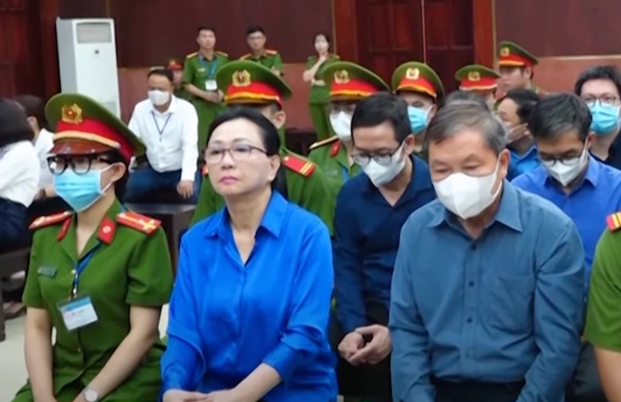Breaking News
Vietnamese Tycoon Loses Appeal Against Her Death Sentence in $12.5 Billion Fraud Case

Source: YouTube
Vietnamese tycoon Truong My Lan has lost her appeal against the death sentence in the country’s largest financial fraud case. Convicted of embezzling $12.5 billion and causing $27 billion in banking losses, the 68-year-old faces execution unless she repays 75% of the stolen funds—approximately $11 billion.
In her November 30 appeal, the fallen real estate tycoon argued for leniency, citing partial repayments and mitigating factors such as her cooperation and remorse. However, the Ho Chi Minh City High People’s Court dismissed these claims, stating that legal issues with seized assets prevented accurate valuation. The court emphasized the crime’s unprecedented scale and its erosion of public trust in Vietnam’s banking system. The case also drew international attention, not only for the severity of the sentence but also for its implications on Vietnam’s economy and anti-corruption campaign.
Background: The Largest Fraud Case in Vietnam’s History
Truong My Lan, chairwoman of Van Thinh Phat Group, orchestrated one of the world’s largest financial fraud schemes over a decade. Between 2012 and 2022, she secretly controlled Saigon Joint Stock Commercial Bank (SCB), approving thousands of fraudulent loans through shell companies she owned. This allowed the Vietnamese tycoon to siphon billions from the bank, destabilizing Vietnam’s financial system.
Her schemes extended to illegal bond issuance and unauthorized transfers of $4.5 billion out of Vietnam. Prosecutors revealed that more than 36,000 investors were defrauded through her operations. The government’s response included freezing over 1,000 of her assets, including luxury real estate and shares in high-profile businesses. While the VIetnamese tycoon’s holdings are substantial, the complexity of liquidating these frozen assets has slowed repayment efforts.
The Race to Avoid Execution
Under Vietnamese law, Truong’s sentence can be commuted to life imprisonment if she repays at least three-fourths of the embezzled funds. The Vietnamese tycoon’s lawyers argue that the total value of her frozen assets exceeds the required amount, but bureaucratic delays and market conditions complicate liquidation. Efforts to raise the funds include reaching out to friends and business associates for loans. However, her legal team has expressed concerns that the death penalty creates a chilling effect on negotiations, further limiting her ability to recover the necessary funds.
Despite the court’s firm stance, Vietnam’s judicial process allows for extended reviews and presidential pardons. Truong’s legal team plans to pursue these avenues, but the clock is ticking as executions in Vietnam, while delayed, are often carried out with minimal notice.
Implications of the Vietnamese Tycoon Embezzlement Case
Truong’s conviction is part of Vietnam’s ongoing “Blazing Furnace” anti-corruption campaign, launched in 2016. The campaign has targeted high-profile figures, including former government ministers and business leaders, aiming to restore public confidence in the country’s economic governance.
The case also raises questions about Vietnam’s financial stability. SCB’s collapse required billions in state recapitalization, shaking investor confidence. With Vietnam positioning itself as an alternative to China in global supply chains, such scandals risk undermining its appeal to foreign businesses.
Observers note the symbolic importance of Truong’s sentence in signaling Vietnam’s commitment to eradicating corruption. However, critics argue that the severity of the penalty, especially for a woman in a white-collar crime case, reflects deeper systemic issues.
What Lies Ahead for Vietnam
Truong My Lan’s future hangs in the balance. While the court has upheld her death sentence, the possibility of a commutation through repayment remains. The coming months will test her ability to mobilize resources under extraordinary circumstances.
For Vietnam, the case is a stark reminder of the cost of unchecked financial malfeasance. As the convicted Vietnamese tycoon’s story unfolds, it serves as both a cautionary tale and a measure of the country’s resolve to address corruption at the highest levels.
Will Truong My Lan escape the death sentence and repay the money she owes? Tell us what you think.
